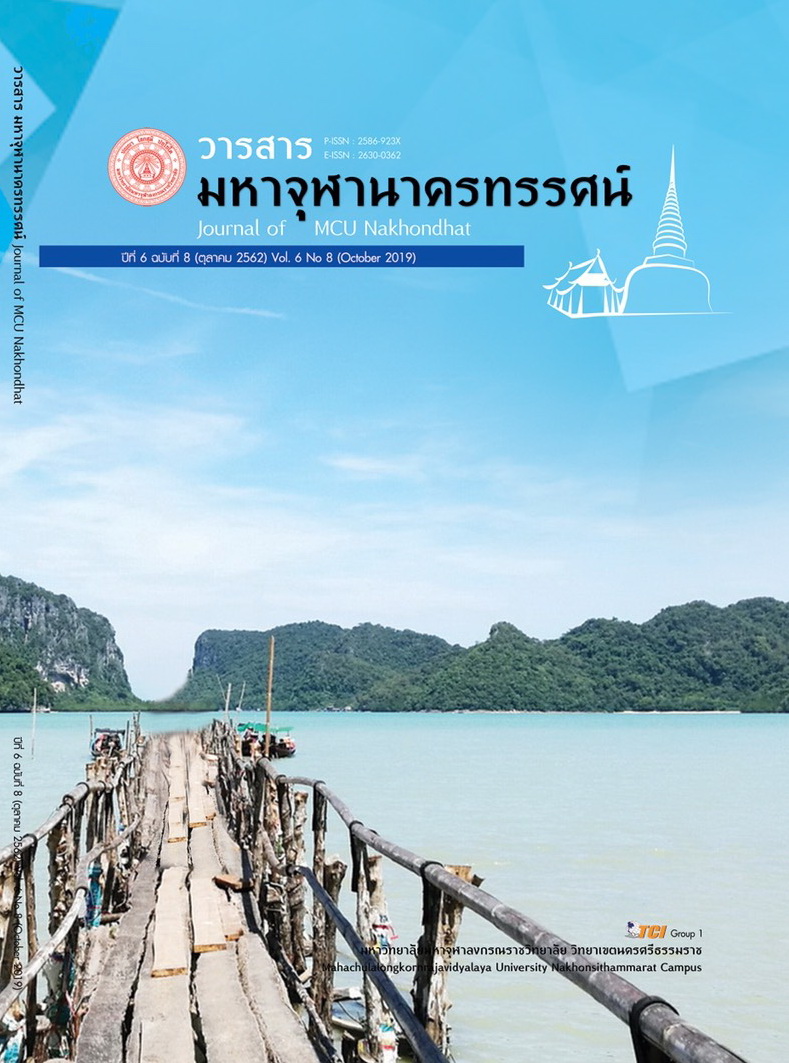BUDDHIST INTEGRATIVE STRATEGY FOR COMPETENCY DEVELOPMENT OF GOVERNMENT TEACHERS UNDER KHON KAEN PRIMARY EDUCATIONAL SERVICE AREA OFFICE 3
Main Article Content
Abstract
The aims of this research were: 1) to study the general conditions of government teachers’ competency; 2) to study the Buddhist dhammas to promote the teachers’ competency; 3) to present the Buddhist integrative strategy of the government teachers under Khon Kaen Primary Educational Service Area Office 3. This study was carried out by using the mixed research methodologies including both quantitative and qualitative methods. In regards to the qualitative research, the study of relevant documents and interview of the key informants including 30 of monks, deputy directors of the Khon Kaen Primary Educational Service Area Office 3, educational administrators and educational supervisors were conducted. In relations to the quantitative research, the data were collected from the samples as 223 teachers in the schools under the Khon Kaen Primary Educational Service Area Office 3.
The research results were as follows:
- There were two problems and obstacles of teacher competency development in the areas of primary missions: learning and teaching, and additional tasks such as administration, finance, supplies, general affairs, and social, cultural natural environment changes, structure and management systems.
- The researcher has integrated the process to enhance the teachers’ competency to perform the quality work based on Buddhist principles: the Threefold Training and the Path of Accomplishment
- There were the indicators of the teachers’ competency development strategies in self-development; namely, for the aspect of research, cultivating love in seeking knowledge and self-learning, using technology at work, meeting or seminar, a study visit; for the aspect of collecting, analyzing and synthesizing, the promotion of personnel participation to create innovation and development of the body of knowledge, thinking outside the box, creative thought, project creation and evaluation for the continuous development; for the aspect of knowledge exchange, knowledge exchange, network creation to work together in various domains, determination of co-targets, generosity, creation of the example leader, inspiration creation to support the generosity and knowledge exchange.
Article Details
References
สำนักงานคณะกรรมการพัฒนาการเศรษฐกิจและสังคมแห่งชาติสำนักนายกรัฐมนตรี. (2554). แผนพัฒนาเศรษฐกิจและสังคมแห่งชาติ ฉบับที่ 11 พ.ศ. 2555– 2559. กรุงเทพมหานคร: สำนักนายกรัฐมนตรี.
สำนักงานคณะกรรมการพัฒนาการเศรษฐกิจและสังคมแห่งชาติสำนักนายกรัฐมนตรี. (2558). ทิศทางของแผนพัฒนาเศรษฐกิจและสังคมแห่งชาติ ฉบับที่ 12. กรุงเทพมหานคร: สำนักนายกรัฐมนตรี.
สุไม บิลไบ. (2558). สมรรถนะ ทักษะและบทบาทของครูไทยในศตวรรษที่ 21. กรุงเทพมหานคร: วิทยาลัยฝึกหัดครูมหาวิทยาลัยราชภัฏพระนคร.
อภินันท์ สิริรัตนจิตต์. (2559). ข้อเสนอแนะประเทศไทย กรณีปฏิรูปการศึกษาไทย ตอน เหลียวหลัง ก่อนหยั่งสู่อนาคต. เรียกใช้เมื่อ 10 กรกฎาคม 2559 จาก www.manager.co.th/Daily/ ViewNews.aspx? NewsID=99 560000084309


